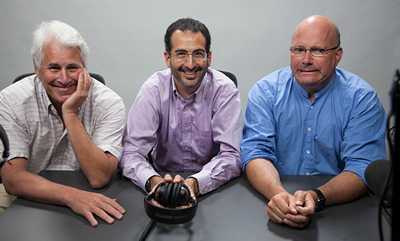PHX Podcast ‘Keeps the Students Listening’.
 “Welcome to Free Associations from Boston University School of Public Health, the public health and medical journal podcast for anyone who is as confused by the latest health study as I am when I try to get the automatic faucets at the airport to recognize that I exist.”
“Welcome to Free Associations from Boston University School of Public Health, the public health and medical journal podcast for anyone who is as confused by the latest health study as I am when I try to get the automatic faucets at the airport to recognize that I exist.”
That was Matthew Fox in a recent episode of the podcast, produced in conjunction with Population Health Exchange. Every other week, Fox and fellow Professors of Global Health Donald Thea and Christopher Gill gather to debate the most newsworthy or otherwise intriguing public health studies of the moment. Since its launch in September 2017, the podcast has been downloaded almost 39,000 times in more than 100 countries, with an audience that includes students and professors at other educational institutions as well as physicians and public health professionals around the globe.
“We set out to have a podcast that would speak to the research community, but also to the lay public who is trying to engage with complicated and sometimes off-putting material,” Fox says. “A lot of the health news in the press has to do with things that people are afraid of, or changes they think they can make to live longer. But other than smoking cessation, there is very little that’s going to be the magic bullet that will extend their life by 10 years.
Infusing topical health information, critical analysis, and humor into each conversation, Fox, Thea, and Gill help listeners digest and dissect the latest headline-dominating public health news. They tackle studies on chronic diseases, nutrition, opioids, and even fecal transplant surgery, then evaluate research findings that claim associations between topics such as exercise and mental health, or the herpes virus and dementia.
“By questioning the effects and relevance of study findings, we offer a healthy perspective on how to approach these topics, and break down research findings in a way that is interesting and also fun,” Fox says.
The hosts divide the show into three segments: the Journal Club, a discussion of an intriguing or noteworthy study; the Deep Dive, during which they pursue current issues in medical research, such as conflicts of interest; and the Amazing and Amusing, an analysis of the wackiest or most fascinating study results du jour.
Jeff Sauer, a recent graduate of the Master of Science program in epidemiology at the London School of Hygiene, says his program director informed him about the podcast, which he began to download for his morning commute.
“Listening to Professors Fox, Gill, and Thea break down the complexity of a headline-grabbing paper is a great way to wake up my mind for the rest of the day,” Sauer says. “The way they work through an issue when it arises in a study provides a good set of questions that students can use to think critically.”
Adrienne Cochran, adjunct instructor of philosophy at Highline College in Des Moines, Washington, has incorporated a Free Associations episode into a segment of her Critical Thinking course on controlled studies. During the episode, the hosts analyzed a study examining the association between clinically recorded alcohol consumption and cardiovascular diseases.
“Students explore how concepts such as confounding factors, reporting bias, and direction of causality, are applied in the podcasters’ analysis of the study,” Cochran says. “Also, the hosts’ scrutiny of media headlines based on the study sharpens the students’ media literacy.”
Fox believes part of the podcast’s appeal is that the hosts explore study angles that their audience wouldn’t normally think about.
“If you tune in to the episodes over and over, our hope is that you gain skills and insight on how to approach the literature,” he says.
All episodes of the Free Associations podcast are available to download on the Population Health Exchange website.